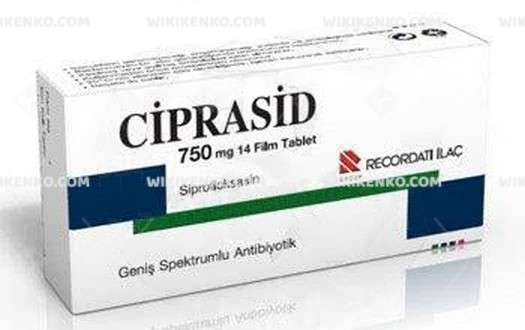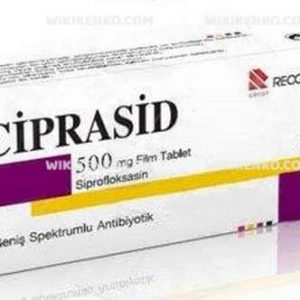Ciprasid Film Tablet 750 Mg
Ciprasid Film Tablet 750 Mg is a powerful medication that contains the active ingredient Ciprofloxacin. This synthetic 4-quinolone derivative has bactericidal activity against a broad range of gram-positive and gram-negative organisms. Here, we will explore the mode of action, pharmacokinetics, uses, dosage, and side effects.
| Potency | 750 Mg |
|---|---|
| Manufacturer | |
| Origin | |
| Generic Name (Ingredient) | Ciprofloxacin Hcl Monohydrate 873 Mg (Equivalent To 750 Mg Ciprofloxacin) |
Assuming your emergency circumstances for this product, visit Urgent Quotation page. Besides, for any pharmaceutical questions, please ask us in the comments section.
Description
Mode of Action
Ciprasid interferes with the enzyme DNA gyrase needed for the synthesis of bacterial DNA. This mechanism of action sets Ciprasid apart from other antibiotics such as penicillins, cephalosporins, aminoglycosides, and tetracyclines. Consequently, organisms resistant to these antibiotics are often susceptible to iy.
Pharmacokinetics
Ciprasid is well absorbed from the gastrointestinal tract after oral administration, and it is widely distributed into the body tissues and fluids. The half-life of Ciprasid is 3.5 – 4.5 hours. About 30-50% of an oral dose of it is excreted in the urine within 24 hours as unchanged drug and active metabolites.
Usage
Ciprasid is used for the treatment of infections caused by sensitive bacteria. It is particularly useful in treating severe systemic infections such as septicemia, bacteremia, peritonitis, infections in immunosuppressed patients with hematological or solid tumors, and in patients in intensive care units with specific problems such as infected burns.
Ciprasid is also effective against respiratory tract infections such as lobar and bronchopneumonia, acute and chronic bronchitis, and empyema. It is also useful in treating urinary tract infections such as uncomplicated and complicated urethritis, cystitis, pyelonephritis, prostatitis, and epididymitis. Additionally, it is indicated for skin and soft tissue infections such as infected ulcers, wound infections, abscesses, cellulitis, otitis externa, erysipelas, and infected burns.
Dosage
Each film-coated tablet of Ciprasid contains 750 mg of active ingredient (Ciprofloxacin). It can be taken with or without food, but it is recommended to take it with plenty of water 2 hours after meals. The dosage and duration of treatment with it may vary depending on the severity and type of infection. Therefore, it is essential to follow the instructions provided by your doctor or pharmacist.
Side Effects
Ciprofloxacin, the active ingredient in Ciprasid Film Tablet 750 Mg, may cause some side effects. Common side effects may include nausea, vomiting, diarrhea, and stomach pain. However, it is important to note that not everyone experiences these side effects, and they may go away during treatment as your body adjusts to the medicine.
In rare cases, ciprofloxacin may cause more serious side effects such as tendonitis and tendon rupture, peripheral neuropathy, and CNS effects. If you experience any of these side effects or any other unusual symptoms while taking Ciprasid Film Tablet 750 Mg, it is important to discontinue the medication and inform your doctor immediately.
Use the form below to report an error
Please answer the questions as thoroughly and accurately as possible. Your answers will help us better understand what kind of mistakes happen, why and where they happen, and in the end the purpose is to build a better archive to guide researchers and professionals around the world.
The information on this page is not intended to be a substitute for professional medical advice, diagnosis, or treatment. always seek the advice for your physician or another qualified health provider with any questions you may have regarding a medical condition. Always remember to
- Ask your own doctor for medical advice.
- Names, brands, and dosage may differ between countries.
- When not feeling well, or experiencing side effects always contact your own doctor.
Cyberchondria
The truth is that when we’re sick, or worried about getting sick, the internet won’t help.
According to Wikipedia, cyberchondria is a mental disorder consisting in the desire to independently make a diagnosis based on the symptoms of diseases described on Internet sites.
Why you can't look for symptoms on the Internet
If diagnoses could be made simply from a textbook or an article on a website, we would all be doctors and treat ourselves. Nothing can replace the experience and knowledge of specially trained people. As in any field, in medicine there are unscrupulous specialists, differences of opinion, inaccurate diagnoses and incorrect test results.





Reviews
There are no reviews yet.